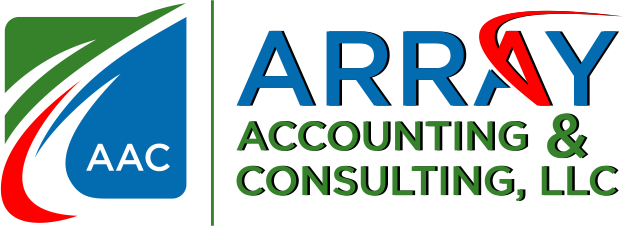Spring Grant Season: Strengthening Financial Reporting to Secure More Funding
- Array Accounting & Consulting

- Mar 3
- 3 min read
Updated: Mar 4

Spring is a critical time for nonprofits as many grant opportunities open for applications. With grantors becoming increasingly data-driven, strong financial reporting is essential to securing funding. Nonprofits that demonstrate financial transparency, accountability, and effective budget management are more likely to win grants and maintain long-term funding relationships.
This guide explores key strategies for strengthening financial reporting, ensuring compliance, and positioning your nonprofit for grant success.
1. Understand Grantors’ Financial Reporting Expectations
Grantors require detailed financial information to assess an organization's stability, sustainability, and impact. According to the National Council of Nonprofits (2023), 68% of grantors prioritize financial accountability when reviewing grant applications.
Common financial documents grantors request include:
Annual budgets showing income and expenses.
Statement of financial position (balance sheet) detailing assets, liabilities, and net assets.
Statement of activities (income statement) outlining revenue sources and expenses.
Cash flow statements tracking the timing of income and expenditures.
IRS Form 990 for compliance with tax regulations.
Review each grantor’s guidelines carefully to ensure your nonprofit submits the necessary documentation.
2. Maintain Accurate and Up-to-Date Financial Records
Grantors seek assurance that grantees can responsibly manage their contributions. According to Tech Impact (2023), nonprofits using financial management software improve reporting accuracy by 35%.
Best practices for maintaining financial records:
Use cloud-based fund accounting software that specialize in non-profit accounting.
Ensure timely reconciliations of bank accounts, donations, and all other transactions.
Create clear financial policies to standardize reporting and minimize errors.
Document restricted vs. unrestricted funds to align with grantors’ grant conditions and to meet IRS and GAAP (Generally Accepted Accounting Principles) standards.
A well-maintained financial system ensures compliance and increases grantor confidence.
3. Develop Grant-Specific Budgets
Customized grant budgets show grantors exactly how their contributions will be used. The Grant Professionals Association (2023) reports that 72% of rejected grant applications fail due to poorly defined budgets.
Key elements of a strong grant budget:
Clearly defined line items (e.g., salaries, program costs, administrative expenses).
Justification for each expense demonstrating alignment with grant objectives.
In-kind contributions (volunteer time, donated goods) to show additional support.
Contingency planning to address potential financial risks.
Ensure consistency between your nonprofit’s overall budget and grant-specific budgets to avoid discrepancies.
4. Strengthen Internal Financial Controls
Strong internal controls reduce financial risk and ensure grant compliance. The Association of Certified Fraud Examiners (2023) found that weak financial controls contribute to 45% of nonprofit fraud cases.
Effective financial controls include:
Segregation of duties (e.g., different staff members handle approvals, payments, and reconciliations).
Regular financial audits to identify and address discrepancies.
Restricted fund tracking to ensure grant money is used as intended.
Board oversight with financial reports reviewed at each meeting.
A transparent financial management system increases grantors’ trust and likelihood of continued funding.
5. Automate and Streamline Grant Reporting
Grant compliance requires ongoing financial reporting. The Nonprofit Technology Network (2023) found that automating grant reporting reduces administrative workload by 40%.
Ways to streamline grant reporting:
Use grant management software like Amplifund to track expenses and deadlines.
Set up automated financial reporting tools to generate grantor-specific reports.
Standardize reporting templates to simplify financial disclosures.
Schedule periodic check-ins to review grant spending and ensure alignment with budgets.
Automation minimizes errors and enhances efficiency in grant financial reporting.
6. Demonstrate Financial Sustainability
Grantors prefer to invest in nonprofits with long-term financial sustainability. A survey by Charity Navigator (2023) shows that 62% of donors and grantors assess financial stability before giving.
Key ways to showcase financial sustainability:
Diversify revenue streams (different grant types, individual donations, corporate partnerships, earned income).
Maintain a 3-6 month operating reserve to manage cash flow fluctuations.
Provide financial forecasts to demonstrate strategic planning.
Highlight past grant success to showcase effective fund management.
A nonprofit with a solid financial foundation is more attractive to grantors.
7. Align Financial Reporting with Impact Metrics
Financial transparency alone isn’t enough—grantors want to see the impact of their investments. According to Giving USA (2023), 78% of grantors consider impact measurement critical in grant decisions.
Best practices for integrating financial data with impact reporting:
Link financial data to program outcomes (e.g., cost per beneficiary served).
Include efficiency metrics (e.g., administrative expenses vs. direct program costs).
Use data visualization (charts, graphs) to present financial and program performance.
Align reports with grantor priorities to show mission-driven financial stewardship.
Telling a compelling financial story strengthens grant proposals and reports.
Final Thoughts: Strengthening Financial Reporting for Grant Success
With spring grant season underway, nonprofits must prioritize strong financial reporting to secure funding. By maintaining accurate records, developing grant-specific budgets, streamlining reporting, and demonstrating financial sustainability, organizations can increase their chances of winning grants.
Need Expert Support for Financial Reporting?
At Array Accounting & Consulting, we help nonprofits enhance financial reporting, ensure compliance, and improve grant success rates. Contact us today to learn how we can support your organization’s financial management needs.





Comments